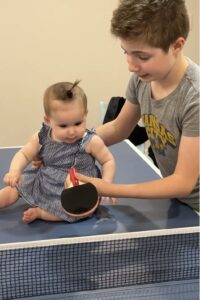Table Tennis Forges Connections Across Ages, Inside and Outside of MILTON Community
November 3, 2025 by
November 3, 2025 by
When you think of a student athlete, you probably think of something like basketball, soccer, or football. What many people in the United States likely don’t think of is ping pong, or table tennis—there’s no difference, but it’s a common misconception, according to Ariel A (‘25).
Ariel is one of many current and former MILTON students who play table tennis competitively. He says ping pong is generally used to describe the game you might find in a basement, and table tennis is used to describe the competitive sport. If you’re serious about it, there’s a whole world of table tennis clubs and competitions, with a complex ranking system, across the country.
Ariel started playing table tennis in 2020, during the COVID lockdown on his dining room table. “My dad brought out one of those expandable nets, and we’d play a lot. It was really entertaining, especially because we didn’t have anything else to do,” he says.
For his 11th birthday, Ariel had a table tennis tournament at a local club. “The owner was super nice,” he says, “and I decided that [the club] was where I wanted to spend my time and improve. I started going more and more, and that turned into after school programs, weeknights, and entering my first tournament.”
As Ariel improved as an athlete, he began to realize that he would need to create his own opportunities to progress in such a niche sport. “The club I play at has so many different lessons and practice groups, but not a specific lesson for children during the week. But I wanted to figure out how to get to the next level, and the simple answer was to play more, and to play with more people. So I started an afterschool club. It was fun and a great way to decompress and give kids some afterschool entertainment, but at the same time it helped me get better and better.”
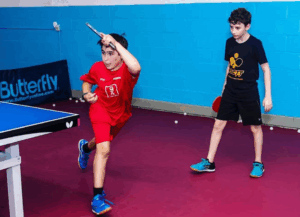
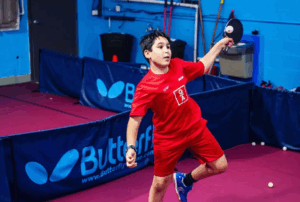
While Ariel has graduated from MILTON, many MILTON and JDS students remain in this afterschool program and continue to foster a strong, growing community of young table tennis players. One is Yoni M-A, a current Grade 7 student who has taken up the mantle of bringing people into the program.
Yoni began playing table tennis when he went to sleepaway camp three years ago and his parents packed a set of table tennis rackets and balls after learning the camp had a table.
“I played there and really liked it,” Yoni says, “but I didn’t know that table tennis clubs and tournaments outside of camp were really a thing. Then, I went to Kansas City with my family and it was -5 degrees outside so there wasn’t much to do. We found a place to play there, and at that place, they told me about clubs in DC I could play at.”
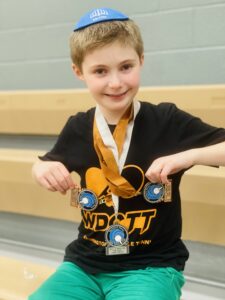
Competitive table tennis is fun, but it’s a serious business too. Competitors often enter tournaments monthly, which can require out of state travel; Yoni is even using his Immersive Learning Week to travel to Las Vegas for the Table Tennis U.S. Open. Players generally practice three or four days a week for multiple hours year round to prepare for tournaments.
“When I’m at practice, I often will work on specific skills one-on-one with a coach, like my control and being more consistent with the ball. Before competitions I do a lot of point practice, where instead of doing a drill I play against someone else in the club until someone scores a point,” Yoni says. “It’s also a really mental sport, where you have to do a lot of thinking. That’s part of why I really like it.”
Competitors often arrive an hour before tournaments to stretch, strategize, practice hits at different speeds, and get their bodies moving. “People think it’s not a real sport, and that you don’t move or exercise,” says Ariel. “But it’s just a different kind of movement. It’s a different kind of exercise. Table tennis is unique in the fact that you need so much skill down to every detail. The racketing, the speed, the spin, the power—so many little things go into one shot and it’s so fast paced that you’re always moving.”
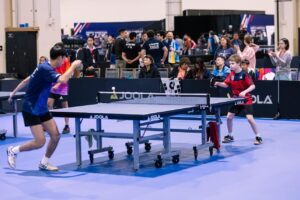
One of Ariel and Yoni’s favorite things about table tennis is the communities they have formed because of it. Ariel appreciates getting to meet new people outside of his regular community. He explains that table tennis is most popular in Asia, and that in the United States it has a small communal feel. “ It’s a really good community I’ve found,” he says. “Everyone’s really nice and supportive. That’s what drew me in in the first place. And I’ve found that, especially going to a Jewish private school, it was a really good way to find diversity in my community.”
Yoni appreciates forging stronger connections with students in his own community too. “I barely even knew Ariel and Elijah [another table tennis player and MILTON alum] before I started playing, but I got to know them when I started going to group lessons. It was great for carpool and I got to meet people I really wouldn’t have otherwise known at all,” he says. He even uses table tennis to bond with his younger sister, as seen in the image to the right.
Ariel even coached Yoni in Yoni’s first years, when Ariel was more experienced. “When Yoni was first starting to go to tournaments, I was getting coached on how to coach so it was a great opportunity to practice. I admire my coach so much, and I’ve found I’m just as passionate about coaching as I am about playing. To see Yoni win, and to get closer with him, I took a lot of pride in that.”
